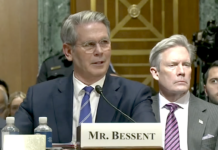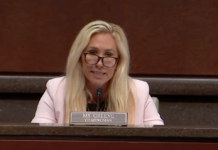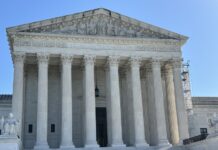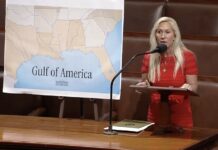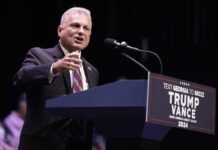WASHINGTON (GA Recorder) — Nursing homes will be required to ensure their staffers are vaccinated against COVID-19, or risk losing federal Medicare and Medicaid dollars, the Biden administration announced Wednesday in a major move on vaccinations as the delta variant sweeps many states.
Under the new nursing home policy, the U.S. Department of Health and Human Services will develop regulations to require vaccinations of nursing home staffers at covered facilities as a condition of participating in Medicare and Medicaid programs.
“I’m using the power of the federal government as a payer of health care costs to ensure we reduce those risks for our most vulnerable seniors,” President Joe Biden said during a news conference detailing new federal action.
“If you visit, live or work in a nursing home, you should not be at a high risk of contracting COVID from unvaccinated employees,” Biden added.
The new federal mandate is the latest vaccine requirement from the Biden administration. The Department of Veterans Affairs has required health care workers to get vaccinated, and all federal workers must either prove they have been vaccinated or face masking and testing requirements.
Georgia’s nursing home staff vaccination rate ranks eighth from the bottom among the states with just under 51% of current staff fully vaccinated, according to data from the Centers for Medicare and Medicaid Services. That’s higher than the state as a whole, with its 42% fully vaccinated rate, but below the 60% national rate of nursing home staff who have gotten shots.
So if they require it and all of a sudden we have a huge number of nursing staff that quits, there isn’t going to be anybody to take care of the people in the nursing homes and assisted living facilities. It’s that dire. – Republican state Rep. Sharon Cooper, chair of the House Health and Human Services Committee
More than 77% of Georgia nursing home residents are fully vaccinated, which puts the state behind all others except Texas, Florida, Arizona and Nevada.
In Georgia, COVID-19 cases at nursing homes spiked near the start of the year, hitting a high of 872 in the week ending Jan. 10, according to Centers for Disease Control and Prevention data.
Shortly after that, the state began distributing COVID-19 vaccines, starting with people in nursing homes and the oldest Georgians, and numbers began to swiftly decline.
By Feb. 21, nursing home cases shrank to double digits, and in the week ending June 1, there was only one reported case of COVID-19 in a nursing home in Georgia.
But over the past few weeks, the number of cases has been creeping upwards, from eight the week of July 18 to 43 at the start of August and 85 last Sunday.
Losing out on Medicare and Medicaid would likely make the economics unsustainable for many Georgia nursing homes, said Laura Colbert of the consumer advocacy group Georgians for a Healthy Future.
“Medicaid is actually more important than Medicare to nursing homes, people may find that surprising, but Medicaid is the primary payer for about three-quarters of Georgia’s nursing home stays, so withholding either bucket of funds would be pretty financially instrumental.
“I think this is a strong signal that the Biden administration plans to use all the tools available to increase the vaccine rate, especially among frontline workers and health care workers,” she added. “And given the vulnerability of people who are in nursing homes and long-term care facilities, I think it’s a very appropriate incentive to get workers vaccinated.”
Others said they were less than thrilled with the decision.
East Cobb Republican state Rep. Sharon Cooper, a nurse who chairs the House Health and Human Services Committee, said she appreciates the Biden administration’s goal of protecting seniors. But she worries about unintended consequences.
“The nursing homes are desperate to find people to take care of our seniors in these facilities,” she said. “There is a huge shortage of certified nursing assistants and (licensed practical nurses). They’re having to supplement and hire part-time people to help, and that’s even just barely covering it.
“So if they require it and all of a sudden we have a huge number of nursing staff that quits, there isn’t going to be anybody to take care of the people in the nursing homes and assisted living facilities. It’s that dire.”
Cooper said she hopes the Biden administration will allow exemptions for religious reasons and for those who already have COVID-19 antibodies from contracting the disease.
The mandate should apply to all health care providers, said Mark Parkinson, president and CEO of the American Health Care Association and National Center for Assisted Living.
“Focusing only on nursing homes will cause vaccine-hesitant workers to flee to other health care providers and leave many centers without adequate staff to care for residents,” he said.
“It will make an already difficult workforce shortage even worse. The net effect of this action will be the opposite of its intent and will affect the ability to provide quality care to our residents. We look forward to working with the administration in the coming days to develop solutions to overcome this challenge.”
Georgia nursing homes faced serious staff shortages before the pandemic. One 2020 studyfrom researchers at the University of Rochester found Georgia and Minnesota were the states with the highest rates of staffing problems, with licensed nurses and nurse aids in short supply at more than a quarter of facilities. The shortages nationwide are mainly driven by the pandemic, the researchers found.
Gov. Brian Kemp’s office did not respond to a request for comment about the new Biden administration policy in time for publication. Kemp has consistently opposed vaccine or mask requirements.
“I think (mandating) just pushes people into a corner,” he told reporters at a press conference Monday. “You see where mask mandates are causing fights at sporting events and on airplanes and other things. People know how to deal with the virus.”
Biden acknowledged that while he has limited authority to require COVID-19 vaccines, he will be looking for additional ways to boost vaccination rates.
He praised governors and mayors in Maryland, California, New York and other states for enacting certain vaccine requirements, and said the federal government will be covering all costs related to National Guard missions related to the coronavirus pandemic.
The nursing home vaccination requirement that Biden announced Wednesday will apply to staffers in 15,000 facilities, which employ approximately 1.3 million workers and serve approximately 1.6 million residents, according to the White House.
Some states and some nursing homes already have required staffers at long-term care facilities — where they may be in close contact with patients at high risk of serious infection — to get a COVID-19 shot.
Maryland Gov. Larry Hogan was the latest on Wednesday, announcing that nursing home staffers in his state will be required to show proof of vaccination, or adhere to ongoing COVID-19 screening and testing.
Nursing homes and other long-term care facilities accounted for a substantial share of the earliest COVID-19 infections and deaths.
Since the beginning of the pandemic, more than 133,000 nursing home residents and nearly 2,000 nursing home staffers nationwide have died as a result of COVID-19 infections.
Defense of school mask mandates
Also at Wednesday’s press conference, Biden criticized Republican governors who have prohibited school boards from requiring students to wear masks.
He said he has directed Secretary of Education Miguel Cardona to use his oversight authority and legal action, if appropriate, to push back against governors who block or intimidate local educators from taking safety precautions in schools.
The New York Times reported that the administration will use the department’s civil rights office for enforcement, and send letters to states including Arizona, Iowa and Tennessee “admonishing governors’ efforts to ban universal masking in schools.” Biden said he would be discussing schools again next week.
Cardona already has written Florida Gov. Ron DeSantis saying that if his administration withholds state funding from school districts that enact mask mandates, those schools can use federal coronavirus relief dollars to make up for the penalties.
Kemp said in May he would prohibit schools from mandating masks, but has since left those decisions to local districts instead.


